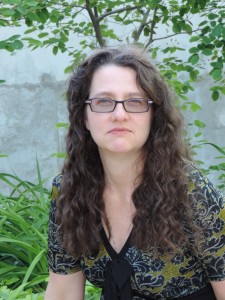 Way back when I asked all of you to assign me some blog topics, Erica Redshift asked what I thought of the generally accepted wisdom that men read fewer books written by women. She’s at the beginning of her writing journey, and is, understandably, outraged to think that putting a woman’s name on her book might trim her potential audience.
Way back when I asked all of you to assign me some blog topics, Erica Redshift asked what I thought of the generally accepted wisdom that men read fewer books written by women. She’s at the beginning of her writing journey, and is, understandably, outraged to think that putting a woman’s name on her book might trim her potential audience.
I had her send me a few of the things she’s been reading on the subject, for context:
Want to be a Successful Writer? Be a Man! (from Jezebel).
Poetactics on women using male pseudonyms.
From Me, You and Books, an attempt to explain why. And Hannah, on W&N, on the same subject.
I’ve struggled for an embarrassingly long time with the question of how to reply. Preferential sexism among my readership is not something I give a lot of thought to in my day to day, or when I’m actually writing something. And yet… I can’t pretend I’ve never given it any thought. I have an idea that I have more female readers than male, but some of my most vocal and enthusiastic fans are guys. (You know who you are, I hope. I treasure you bigtime.)
I can certainly remember my first editor at Tor saying Indigo Springs was, unequivocally, “a girl book.”
It was only at my most recent appearance, in Bellevue Washington, that a number of twenty-something women–people I didn’t know, that is–turned out because they already knew who I was and loved my books.
When I chose to go with my initials as a byline, it was the Eighties. Part of my thinking was definitely about having a gender-neutral name. But some of that ties into my own gender identity, which isn’t exactly cisgendered female. There’s no James Tiptree, though, hiding behind that mysterious A.M.: I’m out and about on the Internet. Everyone who cares to knows who I am: it’s all there, probably, except my blood type.
Maybe I don’t think about it much, but I was on the founding Motherboard of Broad Universe, an organization that describes itself thusly:
We are a nonprofit international organization of women and men dedicated to celebrating and promoting the work of women writers of science fiction, fantasy and horror.
I don’t have a great problem with publishers identifying the target audience for my fiction and trying to market to the marketing at the people most likely to buy it. My publisher does a pretty great job of this, in my opinion. As for who reads my books, who loves my books… that’s entirely out of my hands. I write them. I certainly try to make them cool and lovable.
If someone isn’t into my stuff, I’m great with that. Everyone should seek out fiction they love, right?
So the real question, for a female writer starting out, I think, is “Will this tell against me? If so, what can I do about it?”
I think the answers are the same as they’ve ever been: a) write the best stuff you can; b) Represent. Whether it’s by joining Broad Universe, blogging to support the writers you love, or even just telling someone at a party that Ilana C. Myer has a novel coming out next year and it’s amazing, OMG. Or mentoring talented younger writers, and maybe keeping an eye peeled for people who might fall through the cracks because of gender, or race, or physical ability, or abundant social awkwardness, or whatever, y’know?
Celebrate the good guys. If you take on bad guys, pick your fights carefully, and avoid sticking knives, metaphorical or literal, into your peers’ backs.
Basic human stuff, in other words.
(Erica, I’m sorry this took so long. I kept thinking if I revisited the draft of this essay every week or so, I’d come to some profound insight or another. It did spark some things, but nothing that quite fit into this essay.)



Excellent. I just read and reviewed James Tiptree, by Julie Phillips, a biography of Alice Shelton who wrote amazing science fiction as Tiptree. It is a very insightful account of how gender affects writing.
That is my all-time favorite biography. Sheldon’s story is complex and Phillips did a great job of examining her.
Stephen Michael Stirling I write with my initials rather than my full first name, and for the first five years or so apparently people automatically assumed I was a woman. (Possibly also because of several female protagonists.) Didn’t seem to hurt much.
INDIGO SPRINGS was a ‘girl book’… huh? Didn’t occur to me.
It was a comment made by one guy to another, both of them being from a generation or so before mine. I think that probably had something to do with it.
Heck, Alyx, I’m 15 years older than you and it strikes me as odd.
It’s not that I’m indignant, I’m just puzzled. I’m just trying to think what would have made them think of it as a girl book… was it the body horror, or the bombing campaign?
I mean, you might say Jo Walton’s MY REAL CHILDREN had a very female voice (in an extremely good way, it’s a tremendous piece of work) but INDIGO SPRINGS?